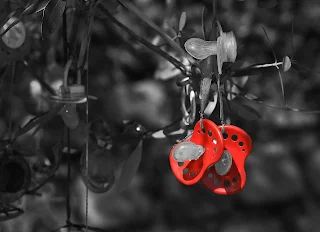The Surprising History of Baby Pacifiers: Tracing the Inventor and Evolution of this Essential Parenting Tool
 |
| Baby Pacifiers |
Baby pacifiers have become a staple in parenting, providing comfort to infants and easing the transition from the womb to the outside world.
While pacifiers may seem like a modern invention, their history dates back to ancient times. In this article, we will explore the fascinating history of baby pacifiers, from their origins to their current role as a parenting must-have.
Early History of Baby Pacifiers
The use of pacifiers dates back to ancient times, with evidence of pacifiers made from natural materials such as animal skin and horns found in archaeological digs. In traditional cultures, pacifiers held symbolic significance, with some cultures believing that pacifiers could ward off evil spirits or provide protection for infants.
The Invention of the Modern Baby Pacifier
The modern pacifier, as we know it today, was invented in the late 19th century. The first pacifiers were made from hard rubber and were shaped like a bulb. As pacifiers became more popular, inventors began to refine their design, making them safer and more durable.
Notable pacifier inventors include Christian W. Meinecke, who invented the first one-piece molded rubber pacifier in 1901, and James E. Parks, who patented a pacifier with a collapsible bulb in 1914.
Baby Pacifiers in the Modern Era
Today, baby pacifiers are available in a variety of materials, including silicone and latex. Pacifiers come in different shapes and sizes, with some designed specifically for premature babies or infants with special needs.
In recent years, there has been a growing trend towards eco-friendly and sustainable pacifiers, with some companies using natural materials such as rubber and wood in their production.
The Role of Baby Pacifiers in Parenting
Pacifiers can provide comfort and soothe infants, helping them to fall asleep or calm down when upset. However, there are also potential drawbacks to pacifier use, including the potential impact on oral development and the risk of pacifier dependence.
Parents should weigh the benefits and risks of pacifier use and follow guidelines for safe and responsible use.
Choosing the Right Pacifier for Your Baby
When selecting a pacifier, parents should consider factors such as the size and shape of the pacifier, the material it is made from, and the age and needs of their infant. Pacifiers should be cleaned and maintained regularly to prevent the buildup of bacteria.
The Future of Baby Pacifiers
As with many baby products, there is ongoing innovation in the pacifier industry. Companies are developing pacifiers with new features, such as self-closing shields and built-in thermometers. The use of sustainable materials is also likely to continue to grow in popularity.
Conclusion
The history of baby pacifiers is a fascinating one, with the modern pacifier evolving from ancient materials to the durable and safe products we know today. While pacifiers are not without their controversies, they remain a popular and useful tool in parenting. As technology and sustainability efforts continue to evolve, we can expect pacifiers to adapt and improve, providing comfort and support to infants and parents alike.
Comments
Post a Comment